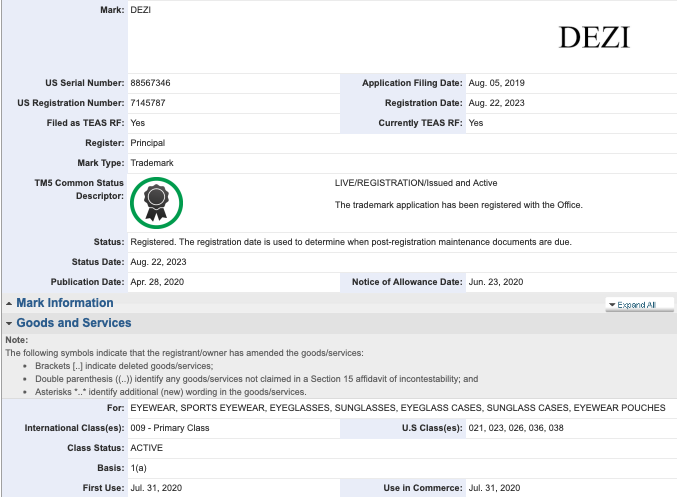Influencer Trademarks
Trademark Law
“A trademark can be any word, phrase, symbol, design, or a combination of these things that identifies your goods or services. It’s how customers recognize you in the marketplace and distinguish you from your competitors” (What Is a Trademark?, 2021). Trademarks ensure that a company’s or individual’s rights to their brand are reserved to them. Additionally, it assures consumers are not misled about the source of a product or service. Trademarks are protected by federal law (the Lanham Act, enacted in 1946) and managed by the US Patent and Trademark Office (“USPTO”).
Although officially registering a trademark with the USPTO provides greater protection, trademarks that are not registered but still meet the requirements are afforded some level of protection. You become a trademark owner and acquire “common law” rights the moment you start using your trademark with your goods or services (Why Register Your Trademark?, 2021). However, the owner’s rights are limited and only apply within their geographical location (What Is a Trademark?, 2021). Registered trademarks provide stronger, nationwide protection. Companies or individuals that have not acquired trademark rights can use the ™ and “SM” symbols to let competitors and consumers know that they think they have trademark rights. On the other hand, the ® symbol can only be used after the brand has been registered with the USPTO (Proskey, 2022). The USPTO is not an enforcement agency, so registered trademark owners are responsible for taking action against infringing individuals (Why Register Your Trademark?, 2021).
The 3 requirements for Trademarks to be Protected by Federal Law:
Satisfies the definition of a trademark
The trademark must be sufficiently distinctive
Must be used in interstate commerce
Trademarks provide protection against the unauthorized use of a word for the goods or services listed in the federal trademark registration, not to own the word for all purposes (What Is a Trademark?, 2021). A trademark registration has the potential to last forever as long as the requirements continue to be met and maintenance documents are filed periodically (Why Register Your Trademark?, 2021).
Influencers and Trademarks
Trademarks are a way for influencers to safeguard their brand identity and capitalize on monetization opportunities. Trademarks protect the unique names, logos, slogans, channel name/username, and other branding elements that are associated with an influencer’s work, products and identity. Trademarking these elements prevents others from using them without the originator’s permission and ensures that fans are not confused or deceived by impersonators. Moreover, these branding elements help them establish their identity in the increasingly saturated world of social media. The elements then become a recognizable symbol of the influencer’s work, giving whatever is associated with them - such as clothes, channel, social media usernames - credibility.
As a result, the influencer’s monetization opportunities can increase. Influencers that can assure the integrity and consistency of their brand may attract companies that are willing to invest in them through collaborations, sponsorships, and endorsements. Therefore, ensuring the uniqueness and limited accessibility of the right to their branding elements is essential to the longevity of an influencer’s career.
Trademarked merchandise
Trademarked merchandise is vital for influencers as it safeguards their brand identity and ensures long-term success in the dynamic landscape of influencer marketing. By registering trademarks for their logos, slogans, and other branding elements featured on merchandise, influencers establish legal protection against unauthorized use or infringement. This not only preserves the integrity of their brand but also maintains consistency and trust with their audience.
Moreover, trademarked merchandise serves as a powerful tool for brand recognition and promotion, with fans becoming walking advertisements as they proudly wear or use products featuring their favorite influencer's branding. This not only increases visibility but also can foster a deeper personal connection between influencers and their audience. Ultimately, trademarking merchandise contributes to building a strong and enduring brand that transcends digital platforms, paving the way for sustained success and growth in the competitive influencer market.
Examples of Influencer-Owned Trademarks
Beyoncé
Beyoncé has trademarks for her name in relation to skincare and cosmetic products, for photographs, posters, stickers, clothing, and “entertainment services in the nature of live performances by a female entertainer,” and for the name of her fan base, “Beyhive.”
MrBeast
James Donaldson, better known by his online alias MrBeast, is a YouTuber known for his fast paced videos, featuring elaborate challenges and large giveaways. With around 256 million followers on YouTube, it is important to ensure that his brand, MrBeast, is not used by others to avoid confusing his large audience. As such, MrBeast has a trademark on his online name as it relates to the content he produces and the merchandise he sells.
Desi Perkins
Desi Perkins is a social media influencer who started off making beauty tutorials on YouTube and became famous for her intricate Halloween makeup. After gaining viral stardom, she went on to start her own makeup line and brand DEZI SKN as well as a eyewear line DEZI. She trademarked DEZI for both categories.
References
Eyster, Z. (n.d.). Navigating Brand Protection and Trademarks for Social Media Influencers. Founders Legal. https://founderslegal.com/navigating-brand-protection-and-trademarks-for-social-media-influencers/
Proskey, C. (2022, January 10). Trademark Symbols – “®” “TM” “SM” – What Do They Mean and When Should I Use Them? BrownWinick Law Firm. https://www.brownwinick.com/insights/trademark-symbols-tm-sm-what-do-they-mean-and-when-should-i-use-them
Sausser, B. (2023, November 15). Influencer Trademark Attorney: Safeguarding Social Media. Online Trademark Attorneys. https://onlinetrademarkattorneys.com/influencer-trademark-attorney/
What is a trademark? (2021, March 31). USPTO. https://www.uspto.gov/trademarks/basics/what-trademark
Why register your trademark? (2021, March 31). USPTO. https://www.uspto.gov/trademarks/basics/why-register-your-trademark
*Discussions of trademarks are also referencing service marks









